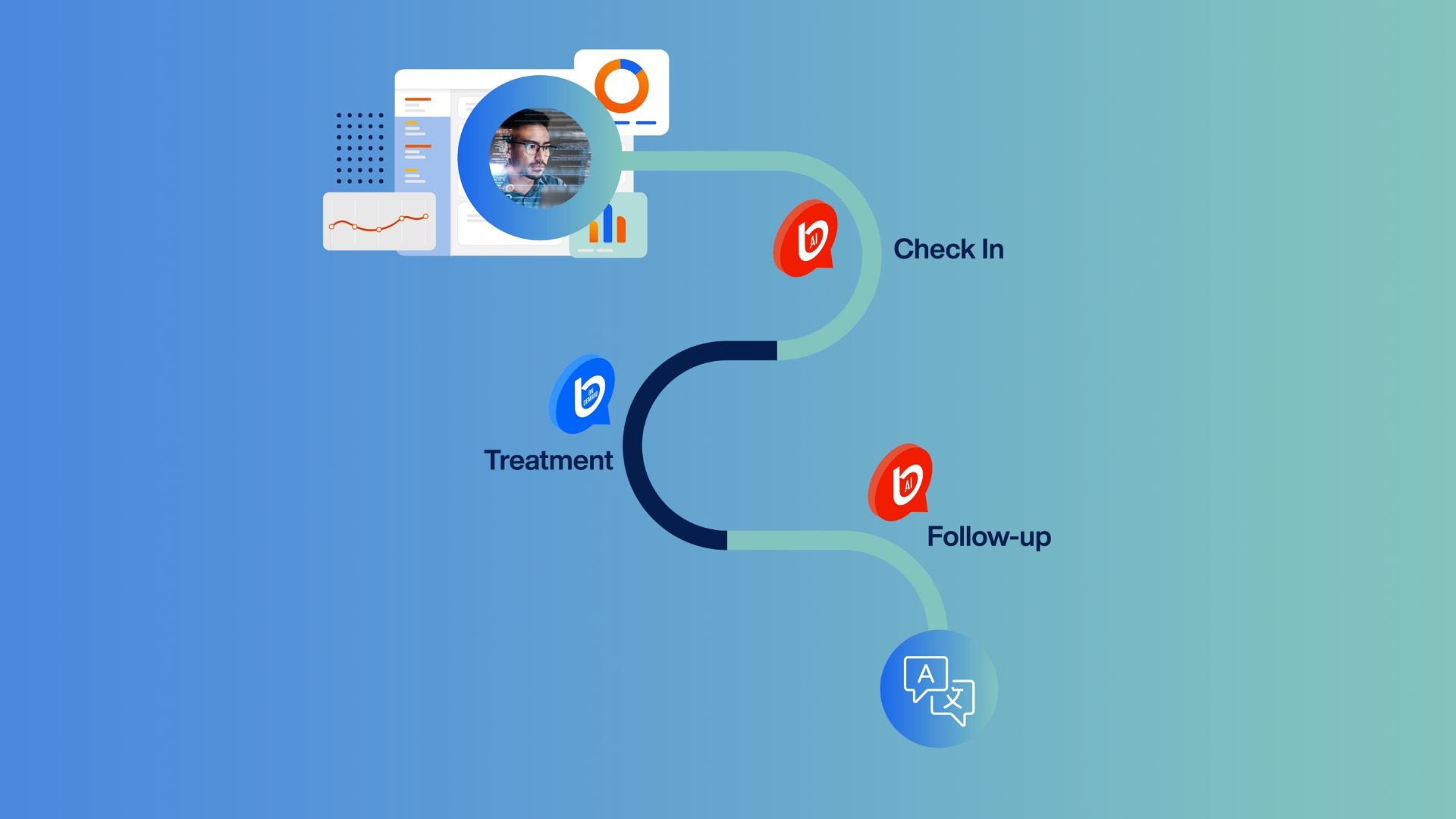Home / Pharmaceutical Language Access Toolkit
Interpreter Services for Pharmaceutical
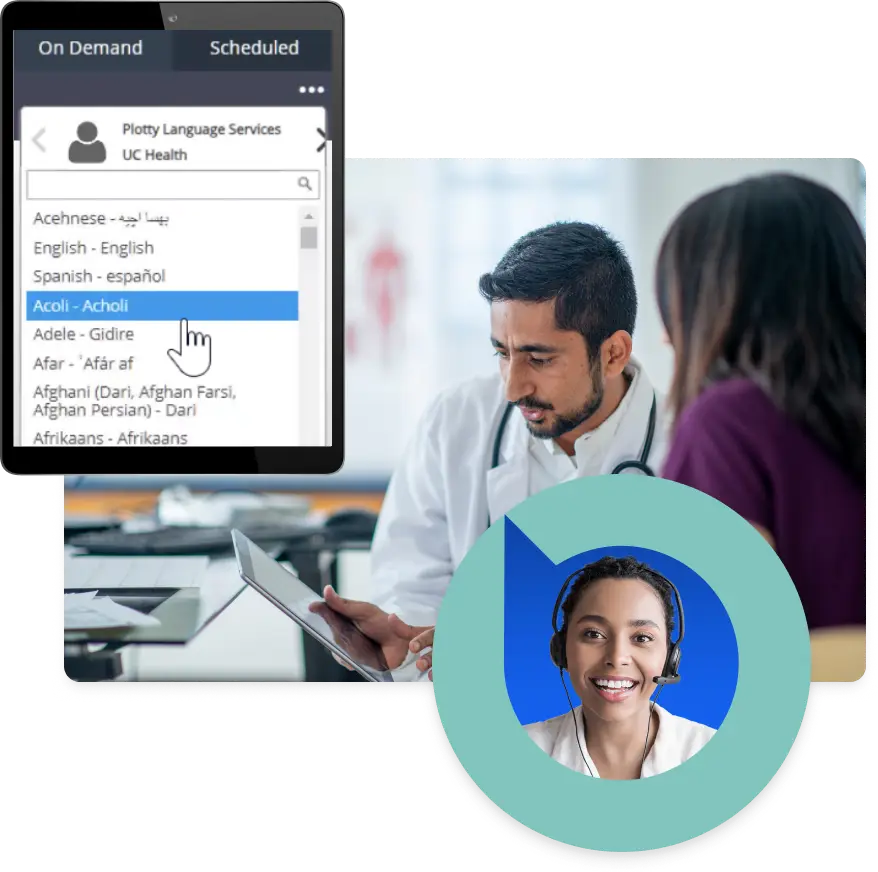
Related Pages
See how Boostlingo customers around the world are driving growth with interpretation and interpreter management services.

Interpreter Services for Pharmaceutical

Aeroflow Health Case Study

Multilingual Pharmaceutical Events
Related Resources
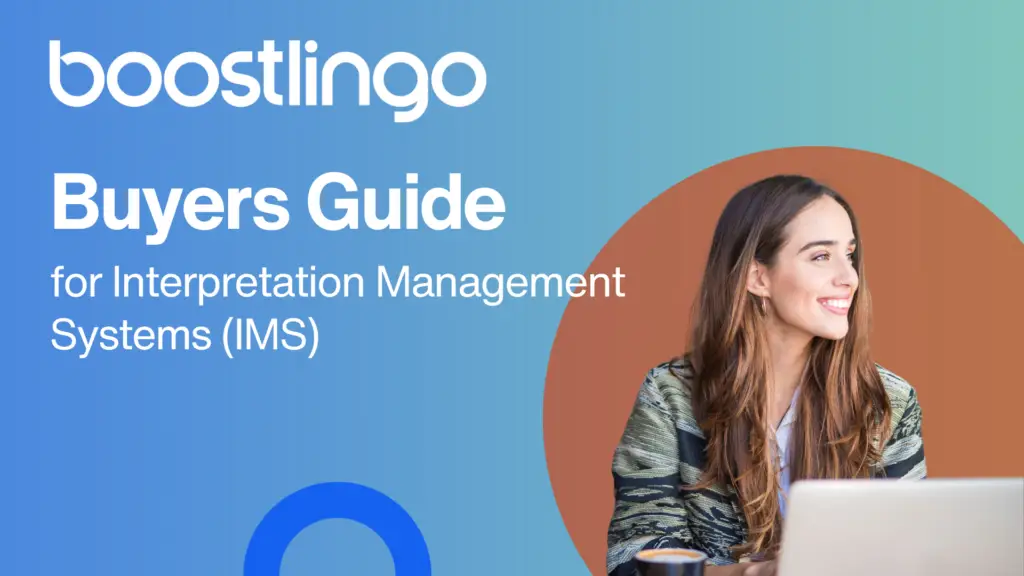
Buyers Guide for Interpretation Management Systems

Healthcare Interpretation Priorities Report
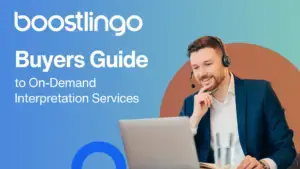
Finding an On-Demand Interpretation Partner
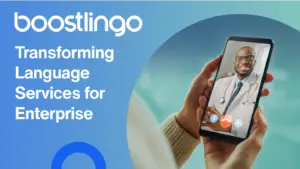
Transforming Language Services for Enterprise Healthcare
Your Partner for All-in-One Language Support
Improve Quality of Care
Cost Savings for Language Access
By switching to Boostlingo On-Demand’s over-the-phone and video remote interpreting services, Goshen Health saved $250,000 annually.
Improve Speed to Care
With Boostlingo’s average interpreter connection time of 13 seconds, Northern Nevada Hopes could increase speed to care and maximize patient care time for their 20-minute appointments.
Simplify Interpreter Scheduling
Pharmaceutical Blogs
Brattleboro Hospital
Gina Pattinson, Director of Marketing
Orthopedic Institute
Elena, Director of Compliance
Brattleboro Hospital
Christina, Manager of Patient Services
Northern Nevada HOPES
Jerry Trigueros, VP of Patient Services
Maven Language Solutions
Chris Evans, Executive Director of Ops
Pharmaceutical Interpretation FAQs
What is a healthcare interpreter?
Healthcare interpreters are highly proficient in the languages they speak and are trained to understand complex processes and terminology in the medical field.
They support communication between doctors and patients and allow them to exchange important information such as medical history, treatment options, and more.
What are the different types of healthcare interpretation?
The three main types of healthcare interpretation are face-to-face interpretation, over-the-phone interpretation (OPI), and video remote interpretation (VRI).
Is the Boostlingo platform secure for the healthcare industry?
Boostlingo is a cloud-based platform that offers interpretation services including healthcare interpretation (also known as medical interpretation). To safeguard the security and privacy of its users’ data, including patient information, the platform is HIPAA and SOC 2 Type II compliant, and employs end-to-end encryption, multi-factor authentication, and regular security assessments.
What are the advantages of having a qualified language interpreter available to patients?
Improved communication
A qualified medical interpreter can help the healthcare professional, and the patient communicate effectively by ensuring that both sides understand and express themselves accurately. This can assist in avoiding misconceptions and offering the best possible treatment for the patient.
Increased trust and confidence
Patients may feel more at ease and secure disclosing sensitive or personal information in the presence of a medical interpreter because they know the interpreter is bound by confidentiality and will appropriately express their words and concerns.
Better health outcomes
Accurate diagnosis and therapy need effective communication. A qualified medical interpreter may assist in guaranteeing that the patient receives the proper therapy by providing clear and accurate interpretation, resulting in better health results.
Reduced healthcare costs
Miscommunications can result in unneeded testing, treatments, and hospitalizations, all of which can be expensive for both the patient and the healthcare system. A medical interpreter on staff can help decrease these expenses by ensuring the patient receives the correct care the first time.
Legal and ethical considerations
In some circumstances, providing interpretation services to patients who do not speak the same language as the healthcare professional may be legally or ethically mandated. Having a licensed medical interpreter on hand can assist in ensuring that the healthcare practitioner meets these standards.
Why is accurate language interpretation important in the healthcare field?
Language interpretation is crucial in healthcare because it helps healthcare workers to successfully interact with patients who speak a different language or who are deaf or hard of hearing. This is critical for ensuring that patients receive high-quality treatment and that their healthcare requirements are completely recognized and met.
Effective communication is a vital component of healthcare, and language problems can make it difficult for healthcare practitioners to effectively diagnose a patient’s condition and administer appropriate treatment.
In these circumstances, language interpretation can aid in clear communication between the clinician and the patient, allowing the practitioner to give the best treatment possible.
Additionally, language interpretation can assist to develop confidence between healthcare practitioners and patients, since it indicates a dedication to ensuring that patients’ needs are addressed and that they are fully educated about their healthcare alternatives.
It can also assist in lessening the risk of medical mistakes, which can arise when communication between healthcare practitioners and patients breaks down.
Overall, language interpretation is a vital tool for ensuring that healthcare personnel can successfully interact with patients and offer the best possible treatment.
Why are language interpreter services important for healthcare?
Interpreting services have become essential for any healthcare setting, especially hospitals that are dealing with an increasing number of non-English speaking and limited English proficient patients. When it comes to medical consultations and emergencies, effective communication is paramount since it directly impacts the quality of care provided.
Having healthcare interpreters within arm’s reach assists healthcare professionals in providing essential healthcare services to patients. Especially in the case of multicultural nations such as the United States, healthcare interpretation fosters inclusivity and helps guarantee equal access to medical care for all individuals.
Are hospitals required to have healthcare interpreters?
In the case of the United States, yes. Regulations such as the Americans with Disabilities Act and Title VI of the Civil Rights Act require healthcare centers to provide language access services to ensure that quality medical treatment is accessible to every person regardless of their proficiency in English.
In addition to the legal requirements to provide language access, the positive impact of healthcare interpretation services on patient care outcomes should not be overlooked. This is especially true for healthcare centers located in areas with a culturally diverse population.
What are the benefits of using our interpreter management system for hospitals?
Systems Integration
An IMS allows your organization to integrate and consolidate various systems and processes: interpreter scheduling, interpreter & client communications, workforce management, and financial management. Our Open API even allows your IT team to integrate BoostIMS into your existing tech infrastructure.
Team Productivity
Instead of switching between various portals for requests, your administrative staff can upload all interpreters (whether they are full-time, contract, or sourced from language service companies) into one system. Appointment requests are sent and accepted in one hub.
Customization
Different hospitals and language access plans have different requirements, so you need a flexible system that can reflect the complexity of your operations. Customize communications, workflows and data collection depending on the communities you serve and your internal billing processes.
Automation
A good IMS allows you to automate many of your manual processes. Automatically broadcast assignments to eligible interpreters, automate email communications, and have the IMS automatically calculate rates for your interpreters based on existing data.
Give your clients and interpreters access to your workflow to streamline requests and calendars. No more manual data entry or back-and-forth external communication required.
Analytics
Having all your data and processes in the same place will give you access to real-time analytics that are critical for your hospital. Analyze the insights offered by your IMS and allocate resources accordingly to staff your departments and appointments for maximum efficiency.
Privacy and security
Using a secure and compliant IMS means you have one less thing to worry about. Our suite is HIPAA and GDPR compliant, and our cutting-edge team is always focused on the latest IT trends.
Product and support
Unlike a home-grown system, you can rest assured your tech stack will improve and evolve over time when you use a vendor’s IMS. No need to waste resources on product development when that is included in your monthly subscription. The same goes for technical support.
What is intelligent routing?
Boostlingo IMS provides best-in-class technology that allows you to tailor interpreter routing choices and fill any vacancies with an on-demand interpreter. Intelligent routing will allow you to make the most of your interpreters and spend more time caring for patients.
Does Boostlingo IMS integrate with electronic health record systems and other healthcare tools?
Boostlingo IMS can integrate with various healthcare software tools, including electronic health record (EHR) systems, telemedicine platforms, and practice management systems, to improve communication with patients who speak multiple languages and enhance the overall quality of patient care. The enhanced ability to interact with EHR systems and other healthcare technologies makes it a valuable resource for healthcare providers seeking to enhance language interpretation solutions for their patients.
Can the Boostingo IMS system route to local agencies if our staff interpreters can’t fulfill an encounter?
Yes! Boostlingo’s routing technology can automatically route encounter requests to your local language agency partners for a single source solution.
How does Boostlingo IMS support interpreter reconciliation when an encounter is complete?
Boostlingo IMS maintains a comprehensive log in its system that allows the interpreter to document the actual start and end time and can push documentation data back into the EHR automatically.
How can my staff interpreters access the Boostlingo platform for managing their daily schedules?
Interpreters can access the platform via the web or our device agnostic app that is available in the iOS and Android stores.
Can Boostlingo route on-demand requests to my staff interpreters during downtime?
Yes, Boostlingo’s routing technology can route to your staff interpreters first if available allowing them to take video remote and over-the-phone interpreting encounters during their downtime.
Is using staff to interpret for patients considered compliant?
Unless your bilingual staff have completed the necessary training to be a medically qualified interpreter, using them to interpret is not compliant.
What about the patient’s family, can they interpret for the patient?
Although the patient’s family plays a critical role as an advocate for the patient, it is essential to remove personal biases that innately come with being a family member. Complications can arise due to these potential biases, and impartiality can create complications. Having a trained and qualified interpreter is the most effective and safest option for interpretation services.
When may I need simultaneous interpretation instead of consecutive interpreting?
Simultaneous interpreting can be a valuable tool to have in any healthcare setting such as hospitals, mental health clinics and more. Incorporating language access into all service offerings is critical to health equity and improved outcomes. Examples include patient education sessions, community outreach to raise awareness, and support groups.

